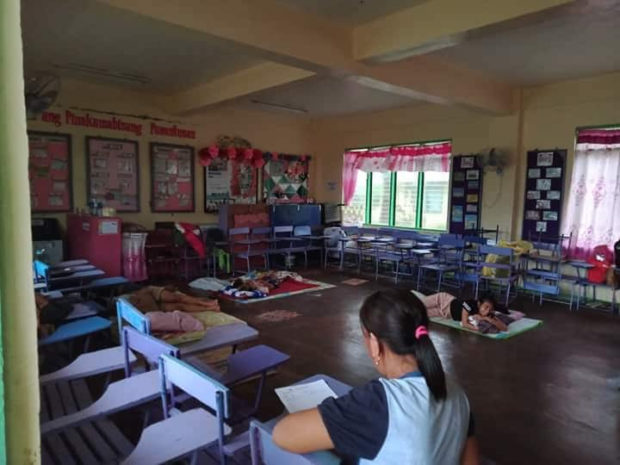
Evacuees follow physical distancing rule as a precaution against the spread of SARS-CoV-2, the virus that causes COVID-19, while inside evacuation centers where they stayed during the onslaught of typhoon Ambo. INQUIRER Visayas file photo / Rachel Arnaiz
MANILA, Philippines — Quezon City 5th District Rep. Alfred Vargas lauded the passage of a bill seeking the establishment of permanent evacuation centers across the whole country, saying it is “a step in the right direction towards ensuring we do not rely on stop-gap measures in our country’s disaster response.”
“Nagpapasalamat tayo sa mga kasama natin sa kamara sa pagkilala sa matinding pangangailangan para sa permanent evacuation centers sa buong bansa [We thank our colleagues in Congress for acknowledging the urgent need to have permanent evacuation centers all over the country]. We should minimize the disruption experienced regularly by our people during calamities,” Vargas said.
The lawmaker is the principal author of House Bill No. 8990 or An Act Establishing Evacuation Centers in Every City and Municipality, and Appropriating Funds Therefor, which the House of Representatives passed Wednesday on third reading with a vote of 195-0-0.
The measure provides for the creation and maintenance of standard-based relief shelters and sites in all cities and municipalities. The Department of Environment and National Resources will be in charge of determining the site of these evacuation centers.
Vargas had lamented in the past the negative effects of converting government facilities like schools into adhoc evacuation centers, thus, affecting the school schedule of students every time evacuees occupy school rooms.
“It is the education of our children that suffers because they are the ones giving way whenever disasters strike. Permanent evacuation centers are necessary because of the frequent natural calamities and disasters our countrymen face. We need to ensure that we house those affected by disasters in safe shelters under humane conditions. We should do away with the practice of using school facilities as evacuation centers because our children’s education is being sacrificed,” Vargas said.
The criteria for determining the location of the permanent evacuation centers are the following:
- It must be centrally-located in the community;
- It must be of a safe distance from large trees, structures where hazardous materials are used and stored, or high-power voltage lines;
- It must be near a health facility;
- It must be located on a geotechnically stable land to avoid risk of landslides or exposure to potential landslide of adjacent lands; and
- It must not be located near military base camps, camps of insurgent groups, power plants, factories, and other areas where the occurrence of human-induced disasters are very high.
The centers should also have minimum amenities such as sleeping quarters, separate shower and toilet facilities for males and females, emergency exit doors, food preparation areas that are well-ventilated, trash segregation and collection areas, health care areas, rainwater harvesting and collection areas, and amenities to enable access thereto by persons with disabilities.
Vargas underscored the need to closely adhere to the standards set by the measure, especially in light of the ongoing Covid-19 pandemic.
If these facilities were built earlier, they could have served as quarantine facilities for those affected by Covid-19, Vargas added. Vargas also expressed hope that the Senate version of the proposed measure would be passed soon.